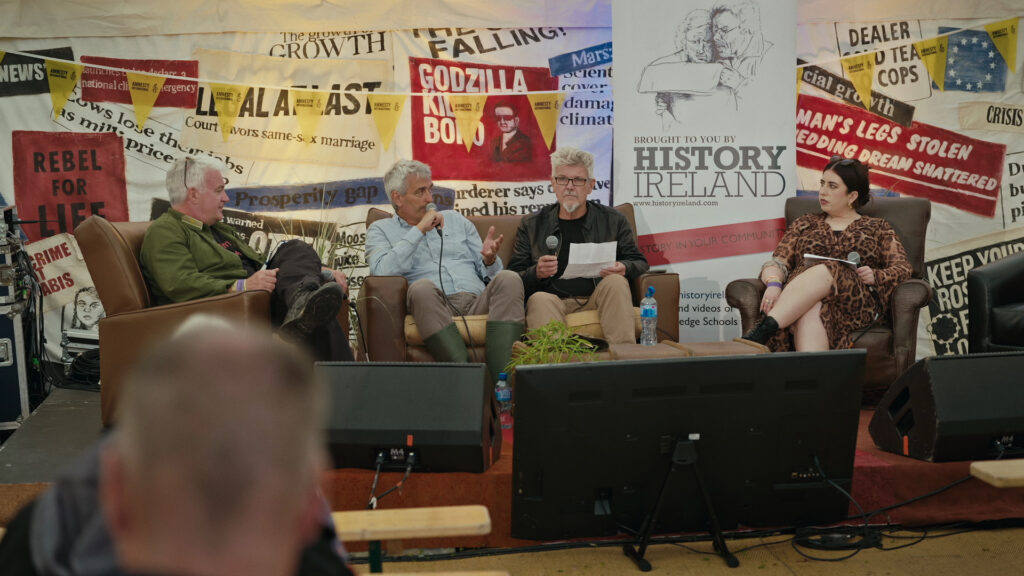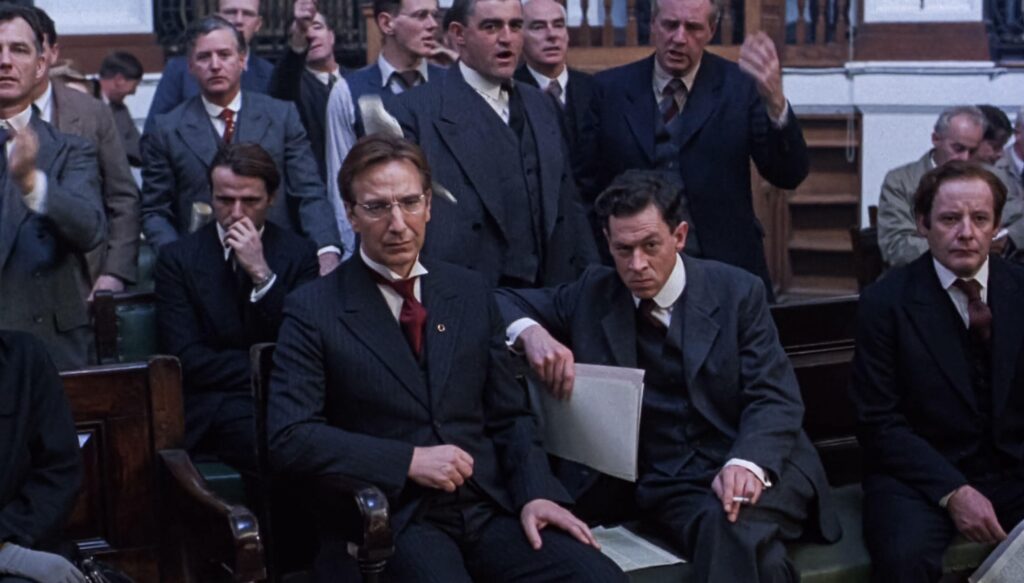RTÉ1, 3 & 10 September 2025
By Brian Hanley

I am, just about, a child of de Valera’s Ireland, but I have a more vivid memory of the death of Sinéad de Valera in January 1975, eight months before her husband, than I do of the passing of Éamon de Valera himself. Sinead was the author of popular children’s books, which we were actually reading in primary school at the time—an indication, perhaps, of the deep implantation of the de Valera name in Irish life. Now I teach students who despise everything that they assume Éamon de Valera stood for but often struggle to name one other taoiseach from the twentieth century. Those more informed still tend to take their cue from Alan Rickman’s portrayal of de Valera in Neil Jordan’s Michael Collins.

Modifying opinions such as these was clearly one of the aims of this two-part documentary. Dev: Rise and Rule provides a good overview of de Valera’s central position in Irish history. His biographer David McCullagh is an engaging and authoritative presenter, and there are generally nuanced contributions from historians. A strong attempt is made to provide a corrective to the overwhelmingly negative modern narrative. The major clichés are generally avoided and some misconceptions debunked (de Valera didn’t have Collins shot). Unfortunately, documentaries have time limits and there is only so much nuance that can be conveyed. There were a number of areas that might have been explored further and a few that were omitted entirely. Early on we learn about discrepancies in de Valera’s birth certificate, with a possibility emerging that the man named as his father, Vivion de Valera, never existed. There is clearly a story here and McCullagh makes the point that his New York origins shaped de Valera, but it might have been explained how de Valera’s background was used as a weapon against him by his political enemies. British and unionist propaganda questioned his ‘real’ nationality; John Devoy called him a ‘half-breed Jew’; and Free State opponents regularly denounced the ‘Spanish bastard’. At the conclusion of the Treaty debates Michael Collins taunted de Valera and his supporters as ‘Foreigners, Americans, English!’ During 1934 de Valera even felt the need to make a speech in Dáil Éireann in which he explained that he was not actually Jewish. Examining the level of xenophobia directed at him would therefore have been interesting, especially in today’s climate.
The revolutionary era, at least after the Rising, is dealt with too perfunctorily. An early example of de Valera’s political skill was in bringing disparate factions into a united and newly republican Sinn Féin party in 1917. Due credit is given to de Valera for his campaign in the US during 1919–20, but the achievement there was even more impressive given the intensely nativist atmosphere in America at the time. The Palestinian historian Rashid Khalidi credits de Valera with a sophisticated understanding of how to present the case for independence and undermine imperial rule. Part of the reason why Britain could not behave in Ireland as it had against the Boers and others was because de Valera had helped make Ireland headline news in America.

The discussion around the Treaty was generally fair, but the pressure of the British threat of war needed more emphasis. Furthermore, de Valera did succeed in convincing many republicans, including Harry Boland and Cathal Brugha, to accept a compromise. The 1922 general election was supposed to have produced a Sinn Féin coalition, containing both pro- and anti-Treaty TDs; Collins repudiated this pact on the eve of the poll. While the brutality of the Civil War was mentioned, it was not really illustrated. We were told that de Valera knew many who died in the conflict personally, but surely the likes of Boland, Brugha, Liam Lynch and Erskine Childers could have been mentioned by name? Perhaps de Valera’s greatest triumph was creating a party that would win power less than a decade after crushing defeat, but the importance of social and economic factors in this was not really explained. The backdrop of the Great Depression and Cumann na nGaedheal’s austerity policies helped Fianna Fáil to victory. The 1932 general election was not a retrospective referendum on the Treaty. While the ‘left of centre’ nature of de Valera’s party was mentioned and their housing programme rightly acknowledged (raising the obvious question of why a much wealthier Irish state cannot accomplish a similar feat now), the way that Fianna Fáil absorbed much of the constituency that might have supported Labour in other contexts wasn’t really explained. It was made clear that Dev was not a fan of Hitler, but the fact that his government had actually faced down a domestic fascist threat, in the shape of the Blueshirts, went unmentioned.
The biggest omission was a consideration of de Valera on the world stage, particularly at the League of Nations. Against the trend of public opinion at home, he led condemnation of Italy’s invasion of Abyssinia in 1935. In the face of intense clerical opposition, he continued to recognise the democratic Spanish government until 1939. And de Valera’s name rang out in India and Africa as an inspiration during decolonisation. The repressive and confessional nature of life in independent Ireland was (entirely correctly) referenced repeatedly. Fintan O’Toole (in a predictable contribution) asserted that slavery (in the form of labour in Magdalene laundries) existed in de Valera’s Ireland. But if that was the case, then slavery existed under Cosgrave, Costello, Lemass and Lynch as well. De Valera was in power for a long time but he was not in power all of the time. How did other governments (who included Fine Gael, Labour, Clann na Poblachta and so on) deal with the Catholic Church and with institutions like industrial schools? Where were the secular, anti-clerical republicans? There was a broad conservative consensus, which may indeed say something about our revolution and its failures. But while de Valera shaped some of this, he did not create all of it.
Brian Hanley is Assistant Professor in Twentieth Century Irish History at Trinity College, Dublin.
